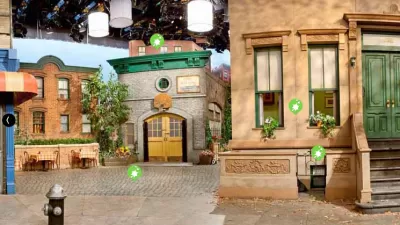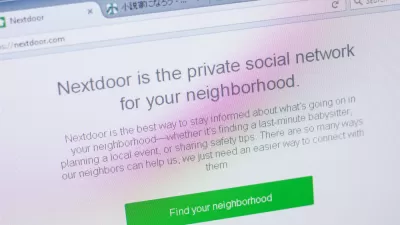How Nextdoor responded to racial profiling on its platform should serve as an example to other forms of social media.
Kashmir Hill follows up on the changes made at Nextdoor, a social network for neighbors, since a March 2015 exposé revealed the tendency of the network's users toward racial profiling. According to Hill, Nextdoor has rolled out changes to the platform that have reduced racial profiling by 75 percent in test markets.
On Thursday, Nextdoor rolled out these changes to all 110,000 neighborhoods on its platform. All users who make posts to their neighborhood’s “Crime and Safety” forum are now asked for additional information if their post mentions race. Nextdoor says that the new forms it’s introducing have “reduced posts containing racial profiling by 75% in our test markets.”
The article goes into more detail about the changes, which rolled out to test markets in April. The changes were inspired by "the work of Stanford psychologist Jennifer Eberhardt," explains Hill, "who studies the way race can influence the judicial system and has helped trained police officers to recognize and overcome their bias."
Hill calls on Nextdoor CEO Nirav Tolia to explain the thinking behind the new questions added to the Nextdoor "crime and safety reports."
“We tried to create decision points,” said Tolia. “To get people to stop and think as they’re observing people to cut down on implicit bias.”
For more on the changes to the Nextdoor platform, Caroline O'Donovan also reported on the changes earlier this month.
FULL STORY: How Nextdoor reduced racist posts by 75%

Planetizen Federal Action Tracker
A weekly monitor of how Trump’s orders and actions are impacting planners and planning in America.

Restaurant Patios Were a Pandemic Win — Why Were They so Hard to Keep?
Social distancing requirements and changes in travel patterns prompted cities to pilot new uses for street and sidewalk space. Then it got complicated.

Map: Where Senate Republicans Want to Sell Your Public Lands
For public land advocates, the Senate Republicans’ proposal to sell millions of acres of public land in the West is “the biggest fight of their careers.”

Maui's Vacation Rental Debate Turns Ugly
Verbal attacks, misinformation campaigns and fistfights plague a high-stakes debate to convert thousands of vacation rentals into long-term housing.

San Francisco Suspends Traffic Calming Amidst Record Deaths
Citing “a challenging fiscal landscape,” the city will cease the program on the heels of 42 traffic deaths, including 24 pedestrians.

California Homeless Arrests, Citations Spike After Ruling
An investigation reveals that anti-homeless actions increased up to 500% after Grants Pass v. Johnson — even in cities claiming no policy change.
Urban Design for Planners 1: Software Tools
This six-course series explores essential urban design concepts using open source software and equips planners with the tools they need to participate fully in the urban design process.
Planning for Universal Design
Learn the tools for implementing Universal Design in planning regulations.
Heyer Gruel & Associates PA
JM Goldson LLC
Custer County Colorado
City of Camden Redevelopment Agency
City of Astoria
Transportation Research & Education Center (TREC) at Portland State University
Camden Redevelopment Agency
City of Claremont
Municipality of Princeton (NJ)




























